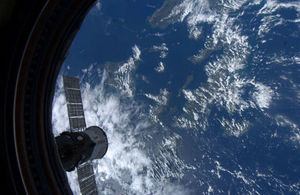New projects see UK space firms tackle Southeast Asian challenges
£11m of UK Space Agency funding announced today will see UK expertise being used to tackle forest fires, dengue and illegal fishing in Indonesia, Malaysia, the Philippines and Vietnam with the benefits being felt across the region.

New projects see UK space firms tackle Southeast Asian challenges
The harmful effects of tropical forest fires affect over 20 million people in Southeast Asia, having a negative impact on people’s health as well as contributing to global CO2 emissions. Many fires occur over drained peatland areas and this project in Indonesia and Malaysia will use satellites to map peat conditions, even when under a forest canopy. Monitoring water levels in this way will enable the risk of fire to be significantly reduced.
The second project being funded will see earth observation data being used as a dengue outbreak early warning system in Vietnam. Early detection will enable public health authorities to mobilise resources to those most in need. The project will also provide forecasts of dengue fever under a range of climate change scenarios. By linking earth observation data with climate forecasting and a land-surface model the impacts of various elements (such as water availability, land-use, climate), on the likelihood of future dengue epidemics can be predicted for the first time.
Satellite technology and data will also be used to help the Philippine government tackle illegal, unreported and unregulated fishing in its waters. The work aims to support the sustainability of the fisheries sector and the 4 million people who rely on it for their livelihood. The project will use a wide variety of data sources, including satellite data to understand the location, time and behaviour of specific vessels at sea.
Nicola Willey, South East Asia Director for Science and Innovation at the British High Commission Singapore, said: “Tropical fires, dengue outbreaks and illegal fishing are problems affecting countless people across this region. It’s great to see that the UK’s world-leading research and technology is being used to positively impact on so many people’s lives through working with partners across Southeast Asia.”
About the International Partnership Programme
The UK Space Agency’s International Partnership Programme uses UK space expertise to deliver innovative solutions to real world problems across the globe. This helps some of the world’s poorest countries, while building effective partnerships that can lead to growth opportunities for British companies.
The successful projects, worth £38 million in total, are led by a diverse range or organisations from the UK’s growing space sector, from large companies such as Inmarsat and CGI, to start-ups such as Guildford-based Earth-i. The UK Space Agency and industry are working together to grow the UK’s share of the global space market to 10% by 2030.
UK Science Minister Sam Gyimah said:
“The UK’s space sector is going from strength to strength. It pioneers new technology and provides jobs for 40,000. Today I can announce that the space sector’s capabilities are being put to use to tackle some of the world’s biggest challenges.
“The UK Space Agency’s International Partnership Programme will help developing countries tackle big issues like disaster relief and disease control, while showcasing the services and technology on offer from our leading space businesses.”
The International Partnership Programme is part of the Department for Business, Energy and Industrial Strategy’s (BEIS) Global Challenges Research Fund (GCRF): a £1.5 billion fund from the UK Government, which supports cutting-edge research and innovation on global issues affecting developing countries.
First round projects
There are 22 existing projects already delivering benefits, including a partnership between Inmarsat and the Philippine government to reduce the impact of natural disasters using satellite communications, which was called into action in December and January when tropical storms killed hundreds of people and displaced tens of thousands more to evacuation centres. The project used British technology and expertise to help relief workers get information in and out of the disaster zones which greatly increase the effectiveness of the response effort, helping them save lives and restore critical infrastructure.
Rupert Pearce, CEO of Inmarsat, said:
“Inmarsat was originally founded to save lives at sea and we are proud that, almost 40 years later, our robust, reliable satellite communication services are deployed throughout the world to assist following natural disasters and humanitarian crises, wherever they occur.
“With the invaluable support of the UK Space Agency, we have been able to pre-equip disaster response teams in the Philippines with vital satellite communications solutions. This meant that when two deadly cyclones hit the country over a two week period, resulting in loss of life and serious damage to terrestrial communications infrastructure, Philippine authorities were able to utilise Inmarsat’s mobile connectivity services to assess the damage and identify the needs of those regions most affected.”
All IPP projects are match-funded by consortium members and international partners to ensure maximum value for money. The programme is fully compliant with Official Development Assistance (ODA) with the Independent Commission for Aid Impact recently reporting that the UK Space Agency had developed robust procedures for ensuring ODA eligibility and was thorough in its ODA compliance screening.
Details of all ten global projects announced today can be found here and here.
More information about the UK Space Agency International Partnership Programme can be found at this link.